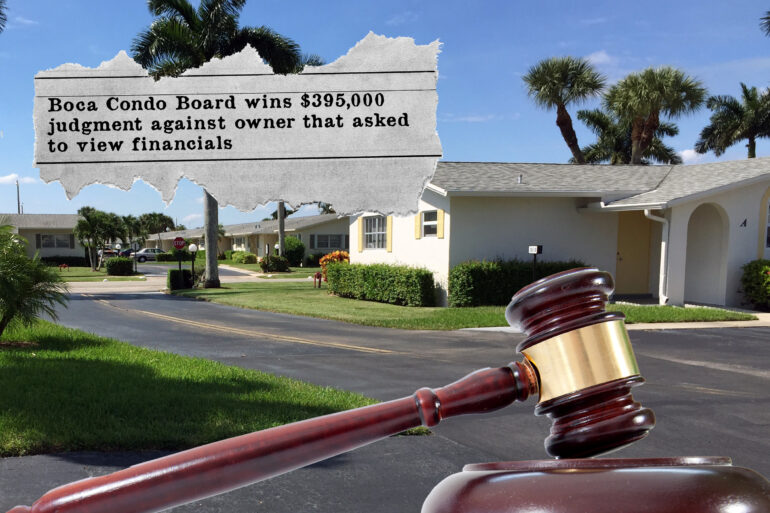Woman Owes Boca Condo Association $395,000 for Asking to See Financials!
Real estate prices have skyrocketed in recent years, especially in the Sunshine State. Floridian real estate grew 20% in 2021, outpacing 42 U.S. states. Higher asking prices have borrowers looking for bargains. You can find some attractive deals if you know where to look. Fixer-uppers and foreclosures can offer attractive buying opportunities.
Some investors look at other real estate asset classes, such as condos and co-ops, to save money. On paper, these assets look enticing. You will save over $100,000 if you buy an average Floridian condo versus an average single-family home in Florida. Those savings can translate into a few hundred dollars off your monthly mortgage payments. Many people are penny-pinching as it is, and a condo or co-op looks like a great complement to those efforts.
A Wolf in Sheep’s Clothing
Buying a condo or co-op is a quick and affordable path to owning a rental, but surprise expenses and condominium associations can turn this investment into a nightmare. When you buy a condo or co-op, you enroll in a dictatorship where you have limited rights and can lose everything for no good reason. Condo associations can hike their administration fees and restrict what you can do in your own unit. Condo association fees can increase your expenses by hundreds of dollars per month. These fees can put a considerable dent in your cash flow and make you barely break even. Paying these monthly fees can make flipping a condo more stressful since you won’t generate cash flow to minimize your expenses. The board can also decide to reject all of your potential buyers or tenants, effectively making you stuck with an unprofitable investment. A single mother’s tale in a Boca Raton condo complex highlights the hidden dangers of condo and co-op ownership.
The board never intended to share the financial records with Eileen, even though state laws give condo unit owners the right to inspect those records.
Eileen Breitkreutz finds herself in a legal battle due to an innocent request. The condo unit owner requested financial records to see how the company managed its income and expenses. Seeing this information can help a unit owner realize if condo association fee hikes are justified or if the association got greedy. These documents can also reveal if the condo association is financially responsible or has money issues. The board never intended to share the financial records with Eileen, even though state laws give condo unit owners the right to inspect those records. The Boca View Condominium Association hired attorneys to keep the documents sealed, triggering a legal battle that has cost Eileen nearly $400,000 to date. The condo association dragged the legal battle, forcing Eileen to pay more in legal fees. The same association is also requiring Eileen to cover their legal fees for their attorneys. Eileen is essentially paying her legal fees and the condo’s legal fees. Eileen has been a resident since 2002 and was the board’s secretary in 2007. Even with this seniority, the board does not care and has not shown any regrets about its behavior.
This same management humiliated Eileen during the ordeal, posting a notice in the public mailroom detailing her debts owed to the condo. The nurse believes management posted this notice as a warning so others would not challenge the board’s authority. Condos and co-ops can currently get away with this behavior because they have deeper pockets than the individual condo owners. Eileen hopes the state will step in and prevent the condo association from seizing her property due to the lien from the legal fees. Meanwhile, the association can comfortably absorb legal expenses because of its fees and other income sources. Eileen’s predicament is not unique. Condos and co-ops engage in this behavior across the country. The Boca View Condominium Association is currently battling several lawsuits from disgruntled residents who dare to speak up and ask questions.
Cheaper Assets Are Not Always the Best Investments
Investors have limited control over their assets and must constantly seek the board’s approval for the slightest requests.
The lower asking prices for condo and co-op units entice many aspiring homeowners and investors. Some investments are cheap for a reason, and condos and co-ops are affordable for a reason. Investors have limited control over their assets and must constantly seek the board’s approval for the slightest requests. Some boards prevent you from housing tenants in your unit. Other boards will review tenant applications and decide whether to approve or reject the tenant’s application. Boards can spite you and reject tenants you want in your unit. You will not receive any rental income during this stretch and will continue absorbing mortgage costs. Some unit owners play nice with the board and become secretaries just to get basic rights you automatically get with a single-family home.
Buying a single-family home in Florida, or anywhere else, will cost more money than a condo or co-op in the same location. The extra cost may get you more square feet, but you also get control, assuming you don’t live in a home with HOA. 44.5% of Floridian homes operate under HOAs, making this an uphill battle. However, it is possible to find investment properties not controlled by HOAs. You don’t have to seek a board’s approval to renovate your property or get tenants. You can avoid association fees, parking costs, and other random expenses from greedy boards.
Do Not Rush into Real Estate
Real estate requires considerable capital, even if you buy a cheaper condo or co-op. If you want to buy a $250,000 condo with a 20% down payment, you need $50,000 in the bank. Real estate’s liquidity makes it challenging enough to sell assets. Condo and co-op unit owners must also get the board’s approval for sales. Management can reject your requests and have liens on your property to prevent you from selling if you don’t play nice.
These investors are at the mercy of associations that tend to abuse their power.
Tying up capital in real estate can generate substantial long-term gains. However, that same capital can produce a negative cash flow. Rushing into real estate can hurt your returns and lead to the wrong decisions. Owning single-family and multifamily properties takes more time. These properties cost more money than condos and co-ops. You will have to make a larger down payment. Some people must put down 25% or more to have a qualifying debt-to-income ratio. However, these properties provide benefits you can never get with a condo or co-op: total control. Having control over who lives on your property and not answering to a board will reduce your stress and lead to fewer legal battles.
Many people invest because they want to become their own boss. Real estate cash flow can help you retire sooner or shift to part-time work. Condo and co-op unit owners are not the bosses though. These investors are at the mercy of associations that tend to abuse their power. Their deeper pockets and current laws give condo and co-op unit owners limited resources to fight back. The best way to fight against condo and co-op boards is to never become a part of the system in the first place.
Good news came in as we were publishing. Circuit Judge John Kastrenakes finished a three-day bench trial in West Palm Beach. The Judge shot down nearly all of the numerous legal arguments raised by Boca View attorneys.
The most recent hearing was found in favor of the condo owners. In a reversal, a condo owner does not need a reason to see the association’s financial records, and the owners can decide who are the ones to conduct the analysis of the records.








